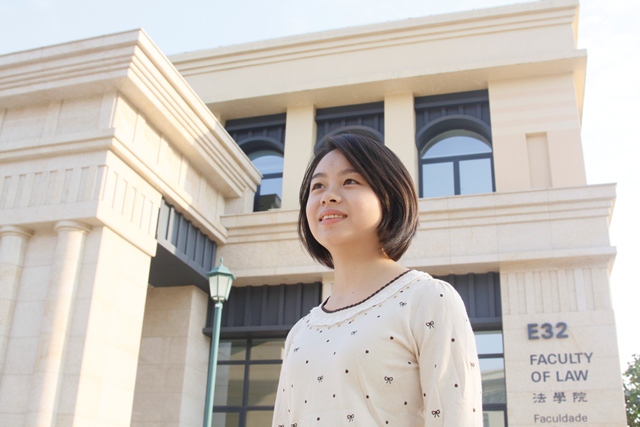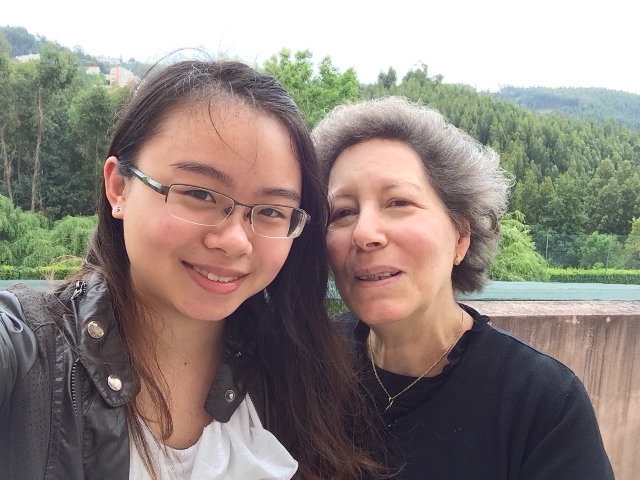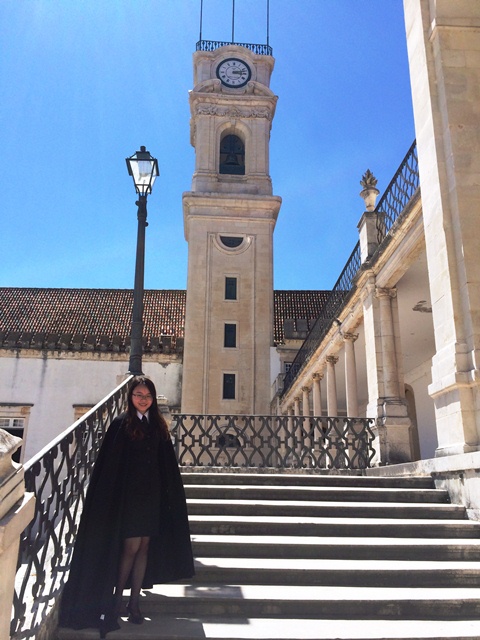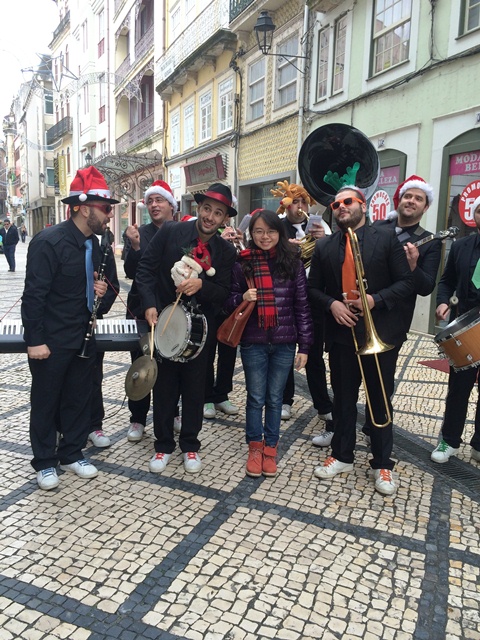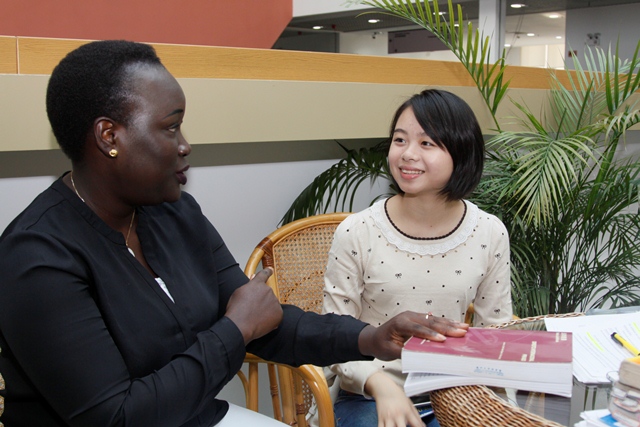Source: My UM
Last year we interviewed Brook Tan because she was not only admitted to UM’s inaugural five-year bilingual bachelor of law programme with exam exemption, but also received the Grand Lotus Scholarship, one of the most coveted scholarships offered by UM. The reason for our second interview with Tan is because within less than ten months of her studies in Portugal she achieved B2 level, the third highest of five levels, in the CAPLE (Centre for Evaluation of Portuguese as a Foreign Language) examination, which is all the more remarkable when taking into account the fact that she had no prior knowledge of the language before she studied at UM. What is her secret to progressing so quickly in Portuguese learning?
A Different Learning Experience
Our first impression of Tan during our second interview was that she appeared more mature and independent compared to the first time we interviewed her. When we told her that, she smiled and said, ‘I had the opportunity to study abroad during the first year, and that experience helped me grow a lot.’
Tan was one of the 26 students who joined the first intake of the inaugural five-year bilingual bachelor of law programme launched last year. After studying at the University of Coimbra for only a year, she made a tremendous progress in her Portuguese language skills, achieving B2 on the CAPLE (Centre for Evaluation of Portuguese as a Foreign Language) examination, a test widely used to determine the fluency of non-native Portuguese speakers. ‘It’s really not easy to master a new language in a short time, so I must study extra hard to prepare myself for the law courses in the next four years which will be conducted in Portuguese,’ she said.
Having a clear goal is half the battle. While in Portugal, Tan attended classes from nine in the morning to eight in the evening, with only a one-hour lunch break every day. ‘We had ten courses, five in the faculty of arts and five in the faculty of law. Portuguese professors speak very fast, and tend to join words together, so in the beginning I had difficulty understanding what they were saying, but still I tried my best to listen and took notes diligently,’ she said. To accelerate her progress in Portuguese learning, she listened to local radio stations and audio books after class. ‘The first thing to conquer when you are learning a foreign language is the pronunciation. You must imitate how native speakers speak like a baby imitates adult speech, and gradually you will develop a feel for the language, and when that happens, learning will become easier,’ she said.
Immerse in the Language and Culture
One of the best ways to learn a foreign language is to immerse yourself in the language and culture. When she was in Portugal, Tan learned by chance that a church near her dormitory was offering a free Portuguese course. A Christian herself, Tan made a bold decision to enroll herself in the course despite her limited knowledge of the language. Through the course she met a kind lady who is a doctor, and despite their big age difference, they quickly became good friends. ‘After some classes, she encouraged me to keep a diary in Portuguese and offered to help correct grammar mistakes in my writing,’ Tan said. ‘She also invited me to her home on weekends to give me one-on-one lessons in Portuguese. Every time she would recommend some of the best Portuguese literature and asked me to read the texts so she could correct my pronunciation. Now even when I’m back in Macao, I still write one article in Portuguese every week and email it to her for correction. She has helped me a lot with my Portuguese, and I’m so grateful that I met such a kind person in Portugal.’
Last Christmas, instead of using the long holiday to travel to other European countries, she went to another Portuguese city—Porto—to spend the holiday in a local family. ‘They are relatives of a friend of my father’s, and although we didn’t really know each other, they were very nice to me. We made Portuguese desserts and decorated the fireplace and Christmas tree together, which allowed me to experience firsthand how Portuguese people celebrate Christmas. I learned practical Portuguese phrases during the ten days I stayed in their house. I will always cherish the beautiful memories of that time,’ she said.
First Day in Portugal Felt like an Adventure
Graduating from high school and entering college brings many changes, and for Tan, the biggest change has been the need to take care of everything by herself. ‘When I was in high school, my parents and my school would arrange a lot of things for me, but now I need to learn to do many things by myself,’ she said. Before her trip to Portugal, she had never travelled far from home alone, so the first day she arrived at the University of Coimbra, she felt a mixture of nervousness and excitement as if she were on an adventure. She didn’t know a soul there and didn’t know the place well. Even such mundane daily task as finding a place to eat suddenly became like a challenge.
‘The campus of the University of Coimbra is very big, and when we first moved into the dormitory, we didn’t know where the teaching section was located on the campus, and it took about 20 minutes to walk from our dorm to the canteen,’she recalled.‘So at that moment it hit me, to successfully transit into the new role of a college student, the first priority is not study, but taking care of everyday tasks like finding a place to eat.’This experience gave Tan a greater appreciation of how convenient it is to have the daily logistics taken care of.‘In the residential colleges here at UM, the college canteens prepare three meals for us, and the staff and fellow students in the college are very caring and helpful. After class, I could ask a teacher study-related questions or chat with college members. I feel really lucky to be able to live and study at UM,’she said.
Find a Way to Study Smart
In the year she spent in Portugal, Tan mainly focused on learning the Portuguese language. It was only after she came back to UM that she started her law courses. And after a two-month trial and error process, she has already found a smart way to study law—learning abstract, complicated legal concepts and terms by combining them with real-life examples. ‘During the year I was studying in Portugal, I had more time to think about how to find a smart way to study, and I also set some goals for myself. With clear goals, you will take fewer detours,’ she said.
Gentle, polite, goal-oriented, and clear-headed. These positive traits Tan possesses will no doubt prove helpful in her pursuit of her dream to become a prosecutor. But her current biggest hope is to learn Portuguese and law well.‘This programme is not easy, but if I can graduate successfully, I will have a competitive edge, because there is a great demand in Macao for legal professionals who are proficient in both Chinese and Portuguese,’she said.

